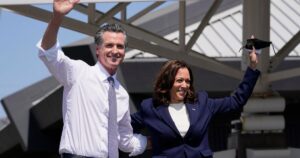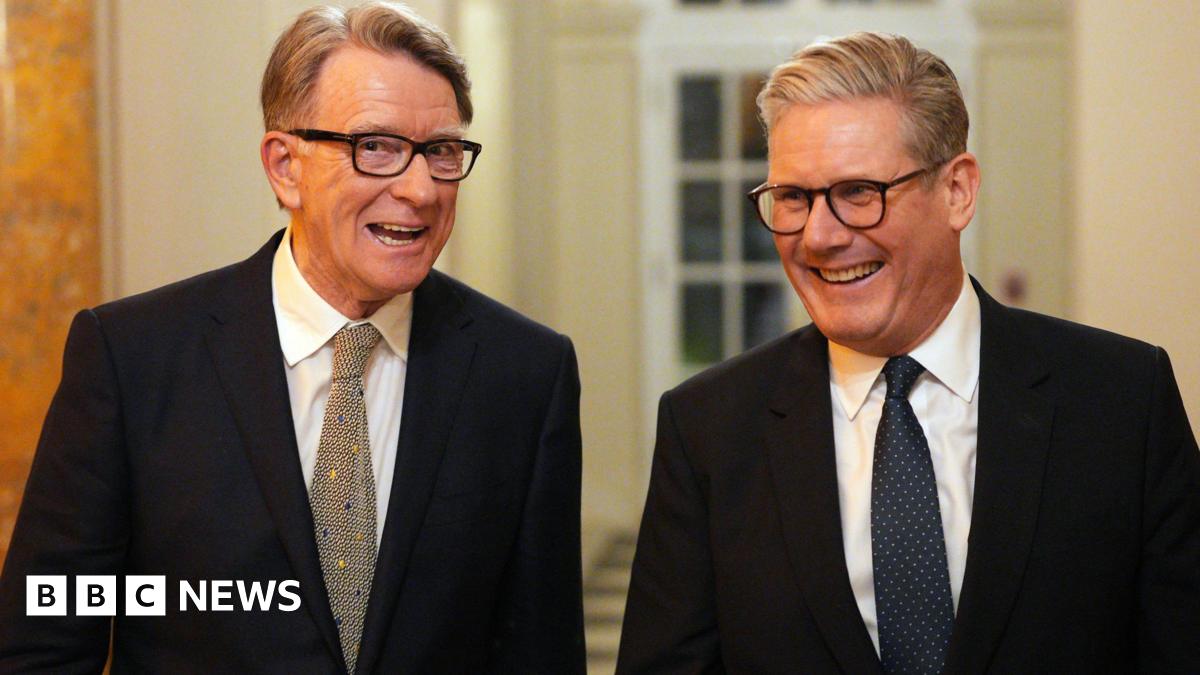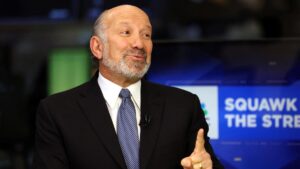‘Widespread revulsion’ in Labour over Mandelson, says MP
Jennifer McKiernan
Political reporter
Labour MP Andy McDonald has said there is “widespread revulsion” in the party over Mandelson’s links with convicted paedophile Jeffrey Epstein, amid growing calls for him to be sacked.
McDonald called for Mandelson to stand down “immediately” as the UK’s ambassador to Washington, following fresh revelations in emails about his relationship with Epstein.
McDonald told BBC Radio 4’s Today programme: “I’m afraid if he [Mandelson] doesn’t do the right thing and resign today then the prime minister should sack him.”
The PM will face “inescapable” questions about his own judgement in appointing Mandelson, said McDonald, who suggested the vetting process may have failed.
Asked how Labour MPs were feeling about Mandelson, McDonald said: “It is widespread revulsion that we, by association, being in the same party, are being brought under the microscope for something that he has done.
“There isn’t anybody in the Labour Party who is supporting Peter Mandelson today and the prime minister’s got to hear that and understand that he’ll weaken his position if he continues to support him.”
Read more on how the how members of the Labour party are reacting to Mandelson’s relationship with Epstein
What happened in Parliament as Mandelson was sacked?
About an hour ago, we were preparing to hear an urgent question about Mandelson’s appointment.
Neil O’Brien was the one granted the question.
He asked if Foreign Secretary Yvette Cooper “will make a statement on the process of the appointment of the United Kingdom’s ambassador to the United States.”
Foreign minister Stephen Doughty, who was standing in the commons on Cooper’s behalf, said: “In light of additional information in emails written by Peter Mandelson, the prime minister has asked the foreign secretary to withdraw him as ambassador to the United States.
“The emails show, Mr Speaker, that the depth and extent of Lord Mandelson’s relationship with Jeffrey Epstein is materially different from that known at the time of his appointment. In particular, Mr Speaker, Lord Mandelson’s suggestion that Jeffrey Epstein’s first conviction was wrongful and should be challenged is new information.
“In light of that, Mr Speaker, and mindful as we all are of the victims of Epstein’s appalling crimes, he has been withdrawn as ambassador with immediate effect.”
Cache of 100 private emails recently revealed
Jennifer McKiernan
Political reporter
The hoard of previously secret emails between Lord Mandelson and Epstein was revealed on Wednesday evening.
The reason they’ve caused such a scandal is because they show an ongoing and supportive relationship between the pair – even after the first allegations of sex crimes against Epstein became international news in 2006.
One email from Mandelson on 7 Jan 2008 states a contact has told him “I will really go for it on your friend now that his case is a bit more realistically salvageable.”
A week later, Epstein told Mandelson an unidentified person referred to only as “mr. big” would meet Jay Lefkowitz, who was one of his defence lawyers. “Lefky is the way mr big refers to him,” Epstein wrote.
Mandelson has previously said he feels “a tremendous sense of regret” about meeting Epstein and taking “at face value the lies that he fed me and many others”.
Davey demands Starmer elaborate on Mandelson appointment
Lib Dems leader Ed Davey has demanded the prime minster come forth to parliament to further explain Mandelson’s appointment as ambassador to the United States.
Following the news of Mandelson’s sacking, Davey says Starmer must “come before Parliament and explain why Lord Mandelson was appointed in the first place, given everything the Government knew then.”
He also called for the PM to appoint an ambassador who will “stand up to Trump, not cosy up to him and his cronies”.
PM and foreign secretary decided on Mandelson sacking this morning, BBC understands
Chris Mason
Political editor
The decision to sack Mandelson was made at a meeting this morning between the prime minister and foreign secretary, the BBC understands.
The information published last night was, I am told, not available to those in government when Lord Mandelson was appointed as they came from what has been described as a “long closed” email address.
The prime minister reviewed the material last night.
Mandelson also did not have access to them.
Those in government continue to insist the normal vetting process was followed during the appointment process of the ambassador.
Question of what Starmer knew is not going to go away
Henry Zeffman
Chief political correspondent
The explanation being given by the government for Mandelson’s sacking is that there was new information in the emails released between him and Jeffrey Epstein yesterday.
Crucially, this new information was “materially different” from what was known at the time of his appointment.
I have already heard from several people within Labour who anticipate that pressure will build on the government to release documents associated with the vetting process in order for the government to prove that that is indeed the case.
Mandelson’s past relationship with Epstein was a matter of public record for some time before his appointment.
What exactly did Starmer know, or not know, beyond that which was in the public domain? That question is not going to go away.
‘Serious questions’ over what PM knew and when, Badenoch says
Conservative leader Kemi Badenoch has weighed in on Mandelson’s withdrawal.
On X, she writes: “Mandelson might have gone but, just as with Angela Rayner, Starmer dithered when he needed to be decisive.
“Time and again he puts party above country. He has no backbone and no convictions. There are now serious questions over what Starmer knew and when. We deserve to know.”
Yesterday at PMQs, Badenoch grilled Starmer about what he knew about Mandelson’s relationship with Epstein. The PM repeatedly said that due process was followed in the appointment, but did not elaborate further.
Performance in the job has never been Mandelson’s downfall – yet again it’s something else
Henry Zeffman
Chief political correspondent
An extraordinary end to an extraordinary career in public life. And this time, yes, surely it is the end.
The “third man” with Tony Blair and Gordon Brown in the creation of New Labour, Mandelson resigned from Blair’s cabinet twice, spent four years in Brussels as Britain’s European Commissioner, and in the final stretch of Brown’s premiership he was essentially the deputy prime minister.
He has generally been seen to have done a very good job in those roles, just as – by common consensus in Whitehall and Washington – he had performed very well as ambassador.
But performance in the job has never been Mandelson’s problem.
And yet again it is something else which has brought him down.
Pressure on Starmer was intensifying after fiery PMQs
Nick Eardley
Political correspondent
The pressure on the prime minister had been growing since PMQs yesterday.
Labour MPs I spoke to thought it was inevitable Mandelson would have to go. Some broke cover to say that on the record.
The government has said it was in response to new information.But there is also real concern among Labour MPs about how No 10 is dealing with crises.
Parliament has been back for a week – and in that time the PM has defended Angela Rayner and Peter Mandelson in the commons, only for both to then leave their jobs within days.
Cooper absent as urgent question on Mandelson goes ahead
It was quite a flurry of breaking news there.
We were expecting Foreign Secretary Yvette Cooper in the chamber to take an urgent question on the processes taken when Peter Mandelson was appointed the UK’s ambassador to the US.
Instead, Foreign Office minster Stephen Doughty has stood in her place for the questioning. At the same time as the questions began, we received word from the Foreign Office that Mandelson was being withdrawn as ambassador.
We are following along and will keep you updated with key lines as they come through from Parliament – stick with us.
Mandelson sacked ‘in light of additional information’ – statement in full
Here’s the statement in full, issued by the Foreign Office:
“In light of the additional information in emails written by Peter Mandelson, the Prime Minister has asked the Foreign Secretary to withdraw him as Ambassador.
“The emails show that the depth and extent of Peter Mandelson’s relationship with Jeffrey Epstein is materially different from that known at the time of his appointment.
“In particular Peter Mandelson’s suggestion that Jeffrey Epstein’s first conviction was wrongful and should be challenged is new information. In light of that, and mindful of the victims of Epstein’s crimes he has been withdrawn as Ambassador with immediate effect.”
Starmer insists ‘due process was followed’ in appointing Mandelson
While we wait for Foreign Secretary Yvette Cooper to take her seat in the Commons, let us remind you of what PM Keir Starmer said on this during PMQs yesterday.
Asked by Tory leader Kemi Badenoch how Peter Mandelson came to be appointed as US ambassador – and what he knew, and when – Starmer told the House: “A full due process was followed during this appointment, as it is with all ambassadors.”
This came after Lib Dem leader Ed Davey asked Starmer if he was aware of the full extent of “compromising material” the White House may have on Mandelson.
Starmer also reiterated that he has “full confidence” in Mandelson, who was “repeatedly expressed deep regret” and is now “playing an important part in the US-UK relationship”.
Jaws drop in Westminster, but No 10 insists due process was followed
Chris Mason
Political editor
This time last week, there was a drip, drip of revelations about the then-deputy prime minister and calls for her resignation.
Fast forward seven days, and there is a drip, drip of revelations about the UK’s ambassador to the United States and calls for his resignation.
A cabinet minister’s jaw drops when I tell them about the story.
For those who have kicked around at Westminster for a while, there is something familiar about it too.
Peter Mandelson twice lost his job in the cabinet two decades ago over his dealings with rich men.
Mandelson’s friendship with the late Epstein has long been publicly known, so the key political questions are actually for the prime minister, in choosing to appoint him.
Downing Street is not currently providing straight answers when we ask whether these most recent revelations are a surprise to them and whether they know what may be still to come.
They insist “due process” was followed before Mandelson’s appointment.
It would appear that either Downing Street was insufficiently curious or sceptical about the extent of Lord Mandelson’s friendship with Epstein before giving him the job, or calculated that he would be so good in the role it would be worth soaking up any embarrassment the connection might cause them.
Or perhaps they hoped the embarrassing stuff would never come out.
Read more here about the dramatic revelations
What is an urgent question?
In some cases, situations may arise that MPs feel require an immediate response from the government.
In these instances, they can apply to ask an urgent question.
MPs make applications to ask these questions to the Speaker of the House of Commons in the morning. If the Speaker’s office agrees that the matter is urgent, the MP can raise their issue in the chamber.
The relevant minister – in this case Yvette Cooper, in her new role as foreign secretary – must then attend the Chamber to address the issue and take questions from MPs.












